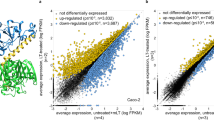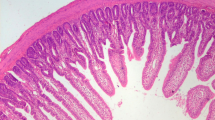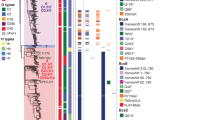Abstract
ABSTRACT: Undernutrition in human infants is associated with more prolonged episodes of diarrheal disease. Therefore, we tested the hypothesis that malnutrition prolongs the duration of Escherichia coli heat-stable enterotoxin-induced rat jejunal secretion. At weaning, rats were separated into two groups: malnourished rats were fed 50% of the previous day's intake of the fully fed control group. After approximately 2 wk of pair feeding, when malnourished rats weighed $$60$$ of the full fed control group, we measured the secretory response to heat-stable enterotoxin in ligated jejunal loops. Toxin-induced secretion was equal in both groups until 30 min incubation time, after which net secretion continued to increase in the malnourished group but decreased in the fully fed group. Jejunal brush border membranes prepared from malnourished and fully fed rats demonstrated similar heat-stable enterotoxin receptor density, avidity of binding and guanyl cyclase activation. In both groups, radiolabeled toxin injected into in situ jejunal loops was converted into an altered radioligand unable to bind to brush border membranes. However, in malnourished rats, there was both increased appearance of two additional radioligands that still retained their ability to bind to brush border membranes and persistence of biologically active unlabeled toxin as measured in the suckling mouse bioassay. Our studies demonstrate that reduced or delayed inactivation of heat-stable enterotoxin, with continued presence of active toxin species, may contribute to prolonged secretion in the jejunum of malnourished rats.
Similar content being viewed by others
Article PDF
Author information
Authors and Affiliations
Rights and permissions
About this article
Cite this article
Cohen, M., Nogueira, J., Laney, D. et al. The Jejunal Secretory Response to Escherichia coli Heat-Stable Enterotoxin is Prolonged in Malnourished Rats. Pediatr Res 31, 228–233 (1992). https://doi.org/10.1203/00006450-199203000-00007
Received:
Accepted:
Issue date:
DOI: https://doi.org/10.1203/00006450-199203000-00007
This article is cited by
-
Escherichia coli Heat Stable (STa) Enterotoxin and the Upper Small Intestine: Lack of Evidence in Vivo for Net Fluid Secretion
Journal of Membrane Biology (2005)



